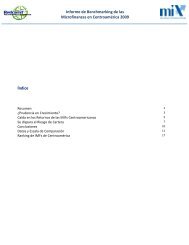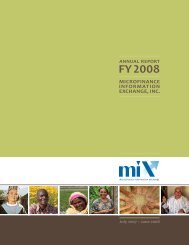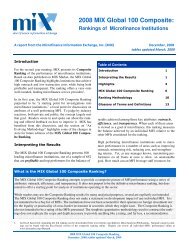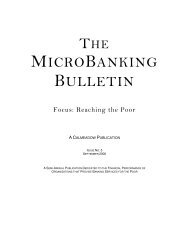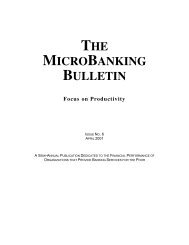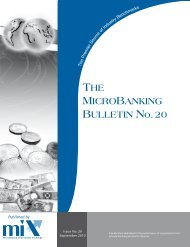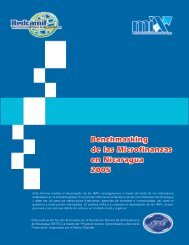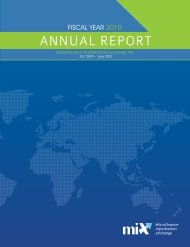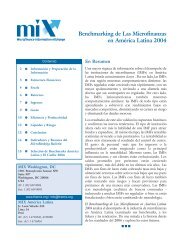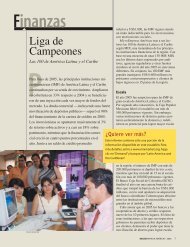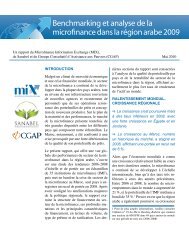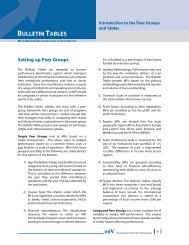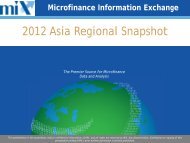Downloading - Microfinance Information Exchange
Downloading - Microfinance Information Exchange
Downloading - Microfinance Information Exchange
Create successful ePaper yourself
Turn your PDF publications into a flip-book with our unique Google optimized e-Paper software.
CASE STUDIES<br />
USD 3,272,480 when it reached financial selfsufficiency<br />
(FSS), qualifying it as a medium scale<br />
institution under the MicroBanking Bulletin definition.<br />
Although the OSS of PADME has tended to vary<br />
more over time than its FSS, there has been a relatively<br />
small difference in these two rates due to the<br />
stable macroeconomic environment in Benin, which<br />
is characterized by low levels of inflation and a low<br />
market interest rate.<br />
Figure 2: PADME’s path towards financial self-sufficiency, 1994–2003<br />
250%<br />
200%<br />
150%<br />
100%<br />
50%<br />
0%<br />
1994 1995 1996 1997 1998 1999 2000 2001 2002 2003<br />
Operational Self-Sufficiency (PADME)<br />
Operational Self-Sufficiency (Africa)<br />
Financial Self-Sufficiency (PADME)<br />
Financial Self-Sufficiency (Africa)<br />
Source: MicroBanking Bulletin no. 10 data. PADME data shown for the period 1994-2003. Africa data shown only for 1999-2002.<br />
The institution’s AROA doubled in 1999, then hit a<br />
relative plateau between 9 and 10 percent thereafter,<br />
far exceeding its African peers, which in 2002<br />
had an average AROA of -2 percent. Annual incremental<br />
increases in PADME’s AROE mirrored similar<br />
increases in the capital/asset ratio. Although its<br />
AROE exceeds that of its peers by a smaller margin,<br />
this performance indicator remains relatively<br />
constrained by the institution’s funding structure.<br />
Indeed, PADME has historically relied heavily on a<br />
combination of donated equity and retained earnings<br />
to finance its growth. In 2003, for the first time<br />
since its inception, accumulated earnings surpassed<br />
donations as the engine of equity growth<br />
and will allow PADME to continue growing steadily<br />
without accessing further debt.<br />
Revenue and Expenses<br />
PADME is subject to an interest rate ceiling imposed<br />
by the PARMEC usury laws of the Central<br />
Bank of West African States (BCEAO), which prevent<br />
it from charging an annual interest rate in excess<br />
of 27 percent. Thus the nominal yield on portfolio<br />
(which includes interest, fees, commissions<br />
and penalties earned on the loan portfolio), has remained<br />
relatively constant over time, averaging 23<br />
percent, significantly less than the average nominal<br />
yield of the Africa peer group (43.4 percent). In<br />
spite of these limitations, PADME makes efficient<br />
use of its assets. Its gross loan portfolio averaged<br />
82.4 percent of total assets between 1999 and<br />
2003, compared to an average of 65.7 percent for<br />
its peers. As a result, its adjusted financial revenue<br />
ratio has tended to slightly exceed that of its peers.<br />
One can explain PADME’s positive returns amid<br />
imposed interest ceilings by its expense breakout.<br />
Since its establishment, all expenses with the exception<br />
of financial expenses have fallen steadily.<br />
Personnel expenses, the single largest driver of<br />
total expenses, declined sixfold in 10 years and<br />
administrative expenses also declined precipitously.<br />
Loan loss provision expenses fell significantly after<br />
1997, the year when the MFI began to write off bad<br />
debts. These expenses have subsequently been<br />
very low due to the institution’s excellent portfolio<br />
quality. In contrast, somewhat constant but low financial<br />
expenses (except in 1995, when high inflation<br />
rates prevailed) reflect the fact that PADME is<br />
heavily financed by equity.<br />
14 MICROBANKING BULLETIN, MARCH 2005



